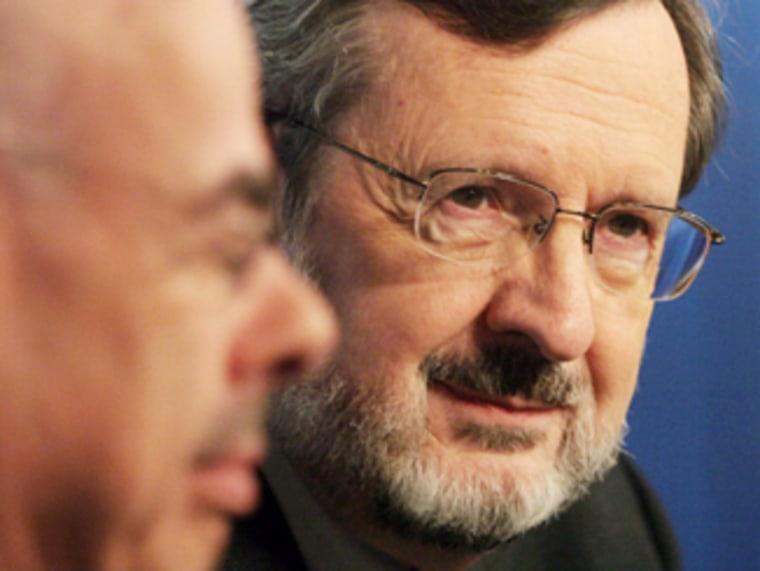After promising unprecedented openness regarding Congress' pork barrel practices, House Democrats are moving in the opposite direction as they draw up spending bills for the upcoming budget year.
Democrats are sidestepping rules approved their first day in power in January to clearly identify "earmarks" - lawmakers' requests for specific projects and contracts for their states - in documents that accompany spending bills.
Rather than including specific pet projects, grants and contracts in legislation as it is being written, Democrats are following an order by the House Appropriations Committee chairman to keep the bills free of such earmarks until it is too late for critics to effectively challenge them.
Rep. David Obey, D-Wis., says those requests for dams, community grants and research contracts for favored universities or hospitals will be added to spending measures in the fall. That is when House and Senate negotiators assemble final bills to send to President Bush.
Such requests total billions of dollars.
Delaying the opposition
As a result, most lawmakers will not get a chance to oppose specific projects as wasteful or questionable when the spending bills for various agencies get their first votes in the full House in June.
The House-Senate compromise bills due for final action in September cannot be amended and are subject to only one hour of debate, precluding challenges to individual projects.
Obey insists he is reluctantly taking the step because Appropriations Committee members and staff have not had enough time to fully review the 36,000 earmark requests that have flooded the committee.
The committee has been absorbed with writing a catchall spending bill cleaning up unfinished budget business from last year and the just-completed Iraq war spending bill.
"It's going to take weeks to get that screening done and I'm the person that has to sign off," Obey told his colleagues at a committee meeting just before Memorial Day. "As long as I'm in charge, I'm going to make doggone sure that we do everything possible to screen every project."
Obey also says many lawmakers requested additional time to get their official requests for back-home projects submitted for review.
Avoiding the public
Budget watchdog groups who "scrub" appropriations bills for questionable provisions are outraged.
"Who appointed him judge and jury of earmarks?" Tom Schatz, president of the Citizens Against Government Waste. "What that does is leave out the public's input."
What Obey is doing runs counter to new rules that Democrats promised would make such spending decisions more open. Those rules made it clear that projects earmarked for federal dollars and their sponsors were to be made available to public scrutiny when appropriations bills are debated.
The rules also require lawmakers requesting such projects to provide a written explanation describing their requests and a letter certifying that they or their spouse would not make any financial gain from them.
The greater transparency was supposed to lead to more self-discipline on the part of lawmakers. While the great majority of home-state projects are easy to defend, there are often clunkers. For example, the "bridge to nowhere," a $223 million span in Alaska to link Ketchikan and Gravina Island, which has a population of about 50.
Ultimately, after the bridge was widely mocked in news account, Congress decided to dump it.
Skirting the issue
Obey has promised to cut congressional earmarks - which the White House says totaled almost $19 billion in 2005 - in half.
Democrats, he says, will follow the new rules when earmarks are added to the bills, which in most cases will not be until House-Senate talks in September.
Republicans say Democrats are skirting the new disclosure rules. Rep. Jerry Lewis of California, the Appropriations Committee's former chairman and now its top Republican, said Obey's move represents "a complete lack of transparency."
Conservatives say they will employ guerrilla tactics during debates in the full House to push their point.
"This is not more sunlight. This is actually keeping earmarks secret until it's too late to do anything about it," griped Rep. Jeff Flake, R-Ariz. "It will be impossible for anybody to challenge any of what will be thousands and thousands and thousands of earmarks."
Some Senate Republicans, meanwhile, are threatening to block appropriations bills from going to House-Senate conference talks if that is when lawmakers' projects are going to be added.
Democrats in the Senate - including Sen. Robert C. Byrd, D-W.Va., who heads the Senate Appropriations Committee - also are unhappy about Obey's move. Many do not like the prospect of waiting until September or October to learn which hometown projects they will get.
